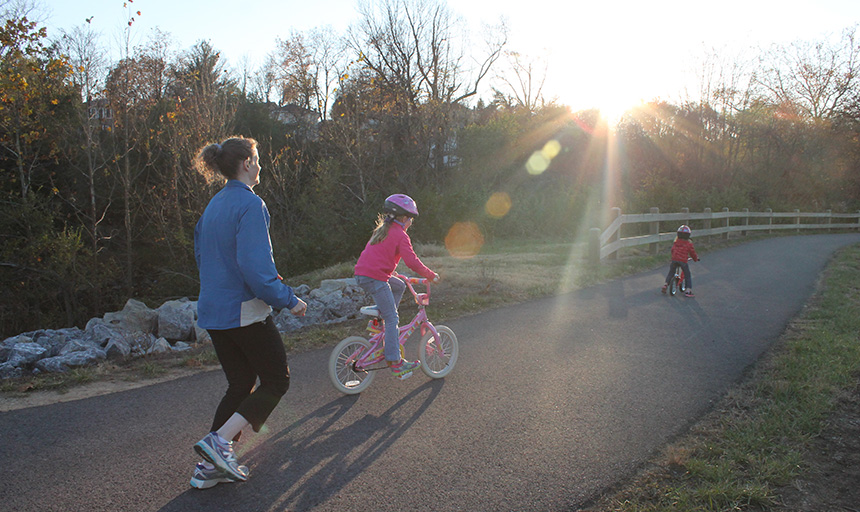Reinvestment Fund & Robert Wood Johnson Foundation name Roanoke an Invest Health City
May 17, 2016

The City of Roanoke has been selected by Reinvestment Fund and the Robert Wood Johnson Foundation to take part in the new Invest Health initiative. Invest Health is aimed at transforming how leaders from mid-size American cities work together to help low-income communities thrive, with specific attention to community features that drive health such as access to safe and affordable housing, places to play and exercise, and quality jobs.
Roanoke was selected from more than 180 teams from 170 communities that applied to the initiative. Cities with populations between 50,000 and 400,000 were asked to form five-member teams including representatives from the public sector, community development, and an anchor institution, preferably academic or health-related.
Roanoke's team comprises representatives from Roanoke College, the City of Roanoke, Freedom First Credit Union, United Way of Roanoke Valley, Healthy Roanoke Valley, and Local Environmental Agriculture Project (LEAP). The team seeks to leverage Roanoke's existing civic infrastructure to guide investment and redevelopment planning efforts in Northwest Roanoke in order to improve health outcomes and neighborhood-level access to healthy living resources.
"We are incredibly excited to have been selected to participate in the Invest Health initiative," Dr. Liz Ackley-Holbrook, from Roanoke College, said. "Roanoke is a fantastic city with incredible resources, yet too many of our residents experience poverty, lack access to healthy foods, and report poor health status. Through our participation in Invest Health, our cross-sector team will learn how to better address issues of health inequity in our city and will actively seek solutions to improve access to healthy living in the neighborhoods that need it most."
Mid-size American cities face some of the nation's deepest challenges with entrenched poverty, poor health and a lack of investment. But they also offer fertile ground for strategies that improve health and have the potential to boost local economies. The program has the potential to fundamentally transform the way Roanoke improves opportunities to live healthy lives by addressing the drivers of health including jobs, housing, education, community safety and environmental conditions.
Through our participation in Invest Health, our cross-sector team will learn how to better address issues of health inequity in our city and will actively seek solutions to improve access to healthy living in the neighborhoods that need it most.
Dr. Liz Ackley-Holbrook, associate professor of health and human performance
"The Invest Health initiative will provide essential support for our efforts to improve community health outcomes" said Roanoke City Manager Chris Morrill. "The funding will allow our team to reach out and make a difference by better addressing health issues and creating an atmosphere of healthy living in neighborhoods that need the most help."
"With a long history in community development finance, we are excited to help create a pipeline to channel capital into low-income communities through public and private investments," said Amanda High, Chief of Strategic Initiatives at Reinvestment Fund. "Our goal is to transform how cities approach tough challenges, share lessons learned and spur creative collaboration."
Over the next 18 months, Invest Health teams will take part in a vibrant learning community, have access to highly skilled faculty advisors and coaches who will guide their efforts toward improved health, and receive a $60,000 grant. Roanoke will also engage a broader group of local stakeholders to encourage local knowledge sharing. Learning from the program will be synthesized and disseminated through the project website.
"Public officials, community developers, and many others have been working in low-income neighborhoods for years, but they haven't always worked together," said Donald Schwarz, MD, MPH, MBA, RWJF Vice President, Program. "Invest Health aims to align their work and help neighborhoods thrive by intentionally incorporating health into community development."
Roanoke's projects will explore a broad range of ideas from novel data collection strategies to transformative changes in neighborhood-level infrastructure. With a particular focus in the Northwest Roanoke neighborhood corridor, examples include methods to facilitate reliable access to healthy foods, active commuting and physical activity, and more accessible transportation. Project teams will travel to Philadelphia for a kick-off meeting on June 7th and will meet regularly to share lessons learned throughout the 18-month project. A full list of awardees and more information is available at www.investhealth.org.